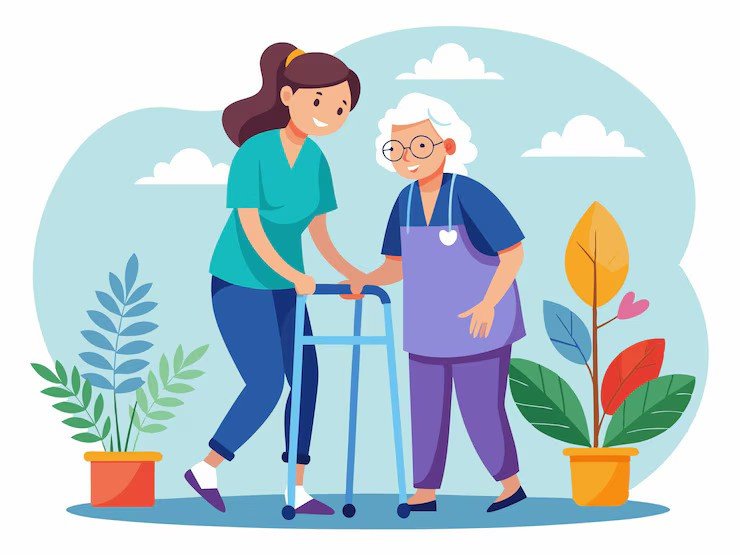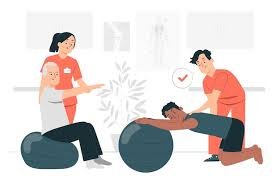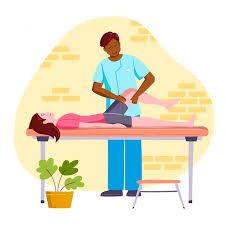Kankarbagh,Patna-800020 Landmark: Near Sri Sai Lions Netralaya
Geriatrics Rehab
Geriatrics Rehab In Patna
Geriatrics rehabilitation is a specialized healthcare service designed to address the unique needs of elderly patients. At Sparc Hospital in Patna, we offer comprehensive care and personalized treatment plans to help our elderly patients recover and maintain their independence. Our focus is on enhancing the quality of life and overall well-being of seniors by providing advanced rehabilitation services that cater to a variety of conditions and health challenges.

What Is Geriatrics Rehabilitation?
Geriatrics rehabilitation is the medical care and therapy offered to elderly individuals facing physical, cognitive, or emotional challenges due to age-related conditions. It encompasses a variety of treatments, including physical therapy, occupational therapy, and speech therapy, aimed at helping seniors regain their independence, manage chronic conditions, and improve overall mobility.
Common Conditions Treated
At Sparc Hospital, we provide specialized rehabilitation for a range of conditions that commonly affect elderly patients, including:
Stroke Recovery: Personalized programs to help patients recover from stroke-induced impairments.
Joint Replacement Recovery: Care for patients who have undergone joint replacement surgery to restore mobility and reduce pain.
Mobility Issues: Addressing challenges related to reduced strength and flexibility.
Chronic Illness Management: Managing conditions like arthritis, osteoporosis, and other age-related conditions.

What Services We Offer In Geriatrics Rehabilitation in Patna?
At Sparc Hospital, we offer comprehensive geriatrics rehabilitation services, including

Physical Therapy
Physical therapy is one of the foundational aspects of geriatric rehabilitation. It focuses on improving the range of motion and strength of joints and muscles, helping patients regain mobility and independence. Our experienced therapists use various techniques and equipment, such as resistance training, balance exercises, and functional training, to support recovery.

Occupational Therapy
Helping patients regain the ability to perform daily activities and self-care tasks. Occupational therapy plays a critical role in geriatrics rehabilitation by assisting patients in relearning and adapting daily activities. Our occupational therapists provide guidance and strategies to enhance fine motor skills and dexterity, ensuring that patients can carry out tasks such as dressing, grooming, and cooking.

Speech Therapy
Speech therapy is essential for patients experiencing communication and swallowing difficulties due to neurological impairments or other conditions. Our speech therapists work with patients to improve their ability to communicate and eat safely, enhancing overall quality of life.

Personalized Care Plans
Creating individualized rehabilitation plans to meet the unique needs and goals of each patient. At Sparc Hospital, we understand that each elderly patient is unique and requires a tailored rehabilitation plan. Our team collaborates with patients and their families to develop personalized care plans that align with their specific goals, ensuring optimal outcomes.

Functional Training
Techniques to improve balance, posture, and gait for safer mobility. Functional training is essential for elderly patients to maintain balance and posture, reducing the risk of falls and injuries. Our therapists provide exercises and strategies to enhance gait and stability, ensuring patients can navigate daily life safely and confidently.

Assistive Technology
Recommendations for devices that can aid in daily living activities and improve quality of life. Assistive technology plays a vital role in geriatrics rehabilitation by offering tools and devices to support daily living activities. These may include adaptive utensils, walking aids, and smart home devices that promote independence and safety.
Why Choose Sparc Hospital?
Choosing the right healthcare provider for geriatrics rehabilitation is essential for effective treatment and improved quality of life. At Sparc Hospital, we pride ourselves on our comprehensive, patient-centered approach and our commitment to excellence in care.
Expert Team
Our compassionate team includes specialized healthcare professionals dedicated to geriatrics rehabilitation. Our multidisciplinary team comprises rheumatologists, physical therapists, occupational therapists, speech therapists, and geriatricians who work collaboratively to provide holistic care for our elderly patients.
Comprehensive Care
We offer holistic and patient-centered care to ensure that every aspect of our patients’ health and well-being is addressed. Our approach focuses on not just treating the symptoms but understanding the overall health of our patients, including mental and emotional well-being.
Advanced Medical Practices
We utilize the latest advancements in rehabilitation techniques and therapies to enhance patient outcomes. Sparc Hospital invests in the latest technologies and evidence-based practices to ensure that our elderly patients receive the most advanced care available.
Personalized Care Plans
Our individualized approach ensures each patient receives treatment that meets their specific needs and goals. We collaborate with our patients and their families to create customized rehabilitation plans that align with the unique circumstances of each individual.
FAQs
Spinal cord injuries can result from various causes, including traumatic events such as automobile accidents, falls, sports injuries, and acts of violence. Non-traumatic causes may include diseases like spinal tumors, infections, or degenerative conditions like spinal stenosis.
Spinal cord injuries are categorized based on the severity and location of the damage. They can be complete or incomplete. Complete injuries result in total loss of sensation and motor function below the injury site, while incomplete injuries allow some degree of sensory or motor function to remain. The level of injury refers to the specific vertebrae affected and determines the extent of impairment.
It’s crucial to immobilize the injured person to prevent further damage to the spinal cord. Call emergency services immediately and avoid moving the person unless necessary. Provide basic first aid, such as stabilizing the head and neck, and wait for trained medical professionals to arrive.
Treatment for spinal cord injuries typically involves a combination of medical interventions, surgical procedures, and rehabilitation therapies. Depending on the severity of the injury, treatments may include medication to reduce inflammation and manage symptoms, surgery to stabilize the spine or decompress the spinal cord, and rehabilitation programs focused on improving function and independence.
